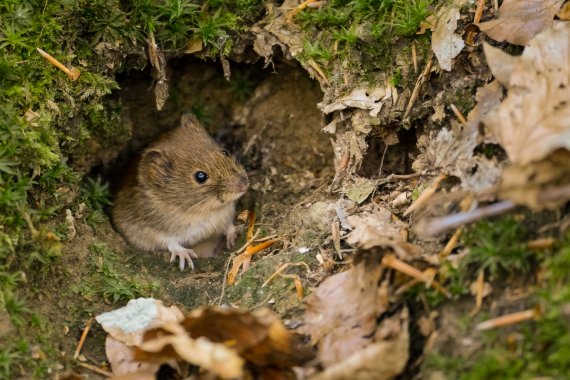One of the bank voles that participated in the study © Alwin Hardenbol
‘What is most striking about these findings is that the effect was caused by second-hand information about a predator’, says co-author Kevin Matson, of the Resource Ecology group. ‘Predation involves more than predators eating prey. Our study shows that just the fear of being eaten has the power to shape the population.’ The authors published their findings in Scientific Reports.
Weasels
The research team conducted the experiment with wild bank voles (Myodes glarealus), a type of rodent common to Finland. Alwin Hardenbol, who conducted the research as part of his Wageningen University master’s thesis, explains: ‘When a separate group of male voles was exposed to a weasel, they produced a chemical signal that could be perceived by other voles in our study.’
It might be that the mothers produce more offspring when the chance of predation is high.
The researchers put bedding material from the weasel-exposed males into outdoor enclosures that contained other male and female voles. The bedding material contained certain alarm pheromones (AP) secreted by the frightened males. Females, who had never actually encountered the weasel themselves, responded to this by producing more offspring. On average, they had almost fifty percent more pups – six instead of four – compared to females in the control group (which was not exposed to the pheromone).
More sex?
How these pheromones cause the females to have more offspring is not exactly clear. It might be that they have more sex. Matson: ‘Voles are induced ovulators, which means females have more young when they mate with more males.’ But it is also possible that the pheromone has a more direct effect on ovulation in the female.
Matson is actually quite surprised by the outcome. ‘We expected the voles to forage less when they are more fearful. This would lead to a poorer body condition, which would result in smaller litter sizes.’ He thinks that maybe in this case, these short-term effects are overruled by the evolutionary long-term effects. ‘It might be that the mothers produce more offspring when the chance of predation is high. Because they might die soon, it would be better in terms of reproductive success to produce many young while they still can. This has been observed in other animals, like stickleback and some bird species.’
Weekly updates about studying and working at WUR? Subscribe to the newsletter now!

